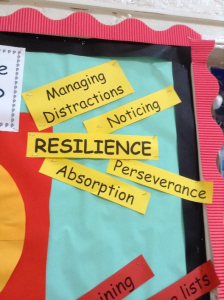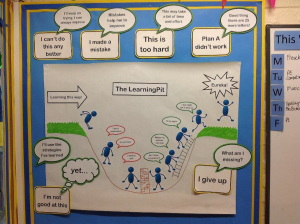
Dr Clare Lee, The Open University.
During the academic year 2015-16 I worked with a group of 22 teachers from 12 different schools (primary and secondary) across the Enigma Maths Hub. I’ve recently published a report about this work (Lee, 2016).
The purpose of the programme was to support teachers in applying some of the ideas from research about Maths resilience to their practice and therefore to improve the classroom experiences of children learning Maths.
The teachers took part in a year-long action research project to introduce mathematical resilience into their classrooms. The teachers worked in pairs in their schools supporting and challenging each other to work differently and to make a difference.
The programme of activities

Concepts relevant to understanding resilience in Mathematics.
The group met four times (November, January, March, June) during the course of the academic year, in the Open University Library for between two and two-and-a-half hours.
In the first meeting, I shared some of the findings from research in this area and introduced tools for thinking about resilience. This was followed by a discussion and work in pairs to plan some activities that they would try in their classrooms.
Subsequent meetings concentrated on sharing experiences, discussing issues and, where necessary, drawing on my expertise in Mathematics resilience.
In the final meeting, the group discussed the format for reporting their work, and worked on their final reports. These were submitted two weeks later and a summary of all the projects was prepared.

A diagram showing some of the problem teachers encountered.
The sorts of problems that were being addressed included:
- Students being reluctant to ask questions;
- Girls lacking confidence in maths;
- Students not persevering but saying, “I can’t do it”.
Other projects focused on progressing problem solving skills, developing self-esteem and raising awareness of students as themselves as learners, paying particular attention to the fact that learning is difficult and it helps to share. “I don’t get it YET” became a mantra in many of the projects.
Measuring success
The success of the programme is down to a number of factors including:
- The focus on classroom practice and applying research to practice;
- Teachers spending relatively little time away from school (two days in total over the whole year) so their classroom teaching was not disrupted;
- The intermediate meetings which ensured that momentum was maintained and the teachers had access to expertise.
From the perspective of the Open University, the work undertaken by the teachers contributed to my understandings of Maths resilience, and is currently being written up for an academic journal.
It was a positive collaboration, in which academics, teachers, and children learning Maths, gained a great deal.
Reference
Lee, C. (2016). Developing Mathematical Resilience: Teachers’ reflections on working to develop mathematical resilience in learners. Enigma Mathematics Hub, Milton Keynes.
Available from: http://www.enigmamathshub.co.uk/copy-of-enigma-teaching-for-mastery
Acknowledgements
This post discusses an activity that was organised through the Enigma Maths Hub and the RCUK-funded School-University Partnership Initiative (SUPI). From 2013-2016, the a Open University worked in partnership with the Denbigh Teaching School Alliance through the ‘Engaging Opportunities‘ Project.

